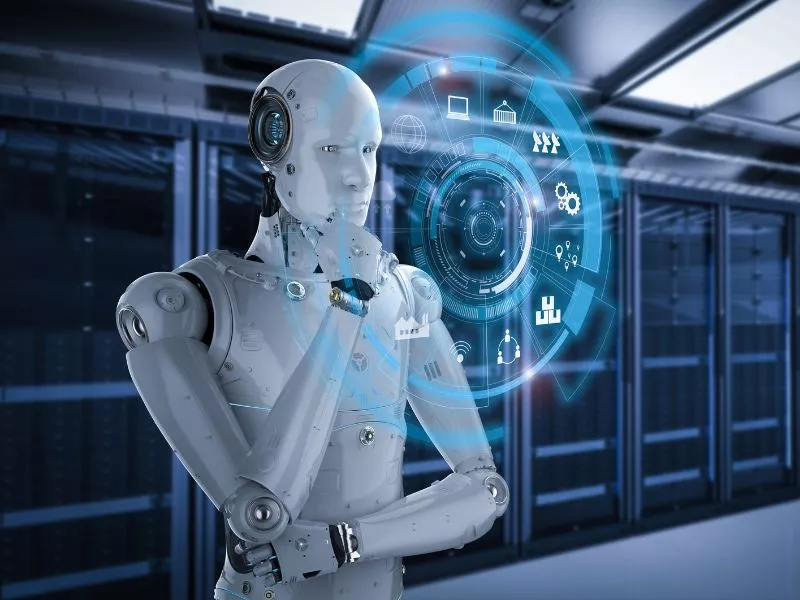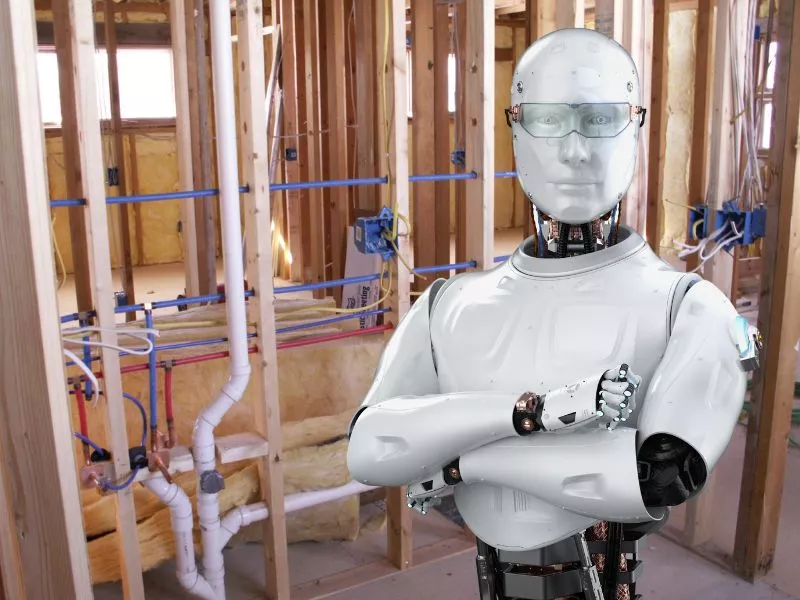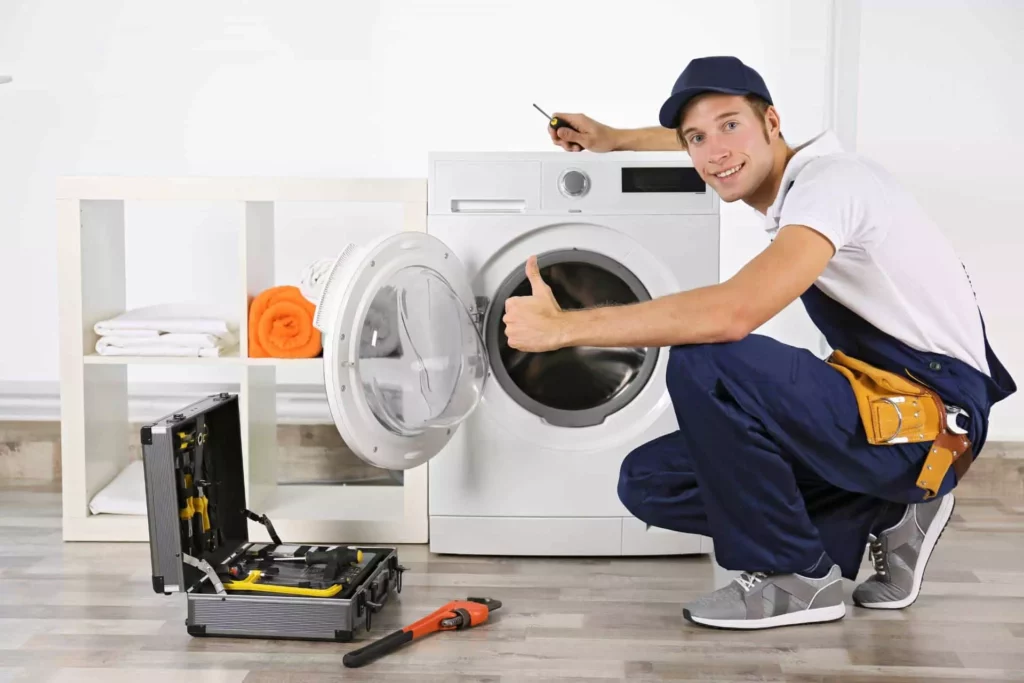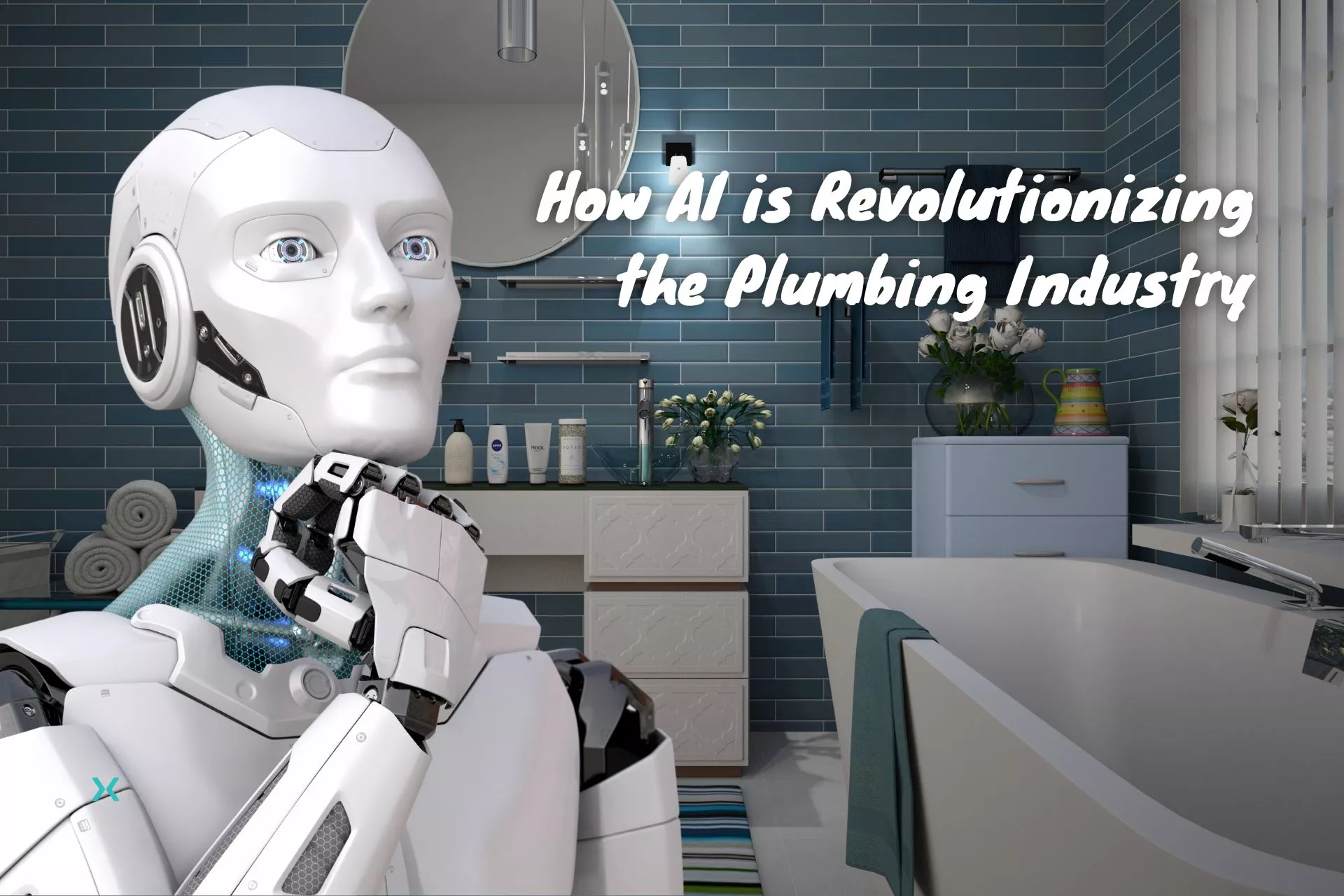Can Plumbing Be Automated?
The advent of artificial intelligence (AI) has revolutionized the way many industries operate, and the plumbing industry is no exception.
In the past, plumbing work often involved extensive manual labor, repetitive tasks, and extensive trial and error. However, with the integration and development of AI technology, the industry is undergoing a transformation that promises greater efficiency, accuracy, and sustainability.
From AI-powered leak detection and prevention systems to smart water management solutions, the potential applications of AI in the world of plumbing work are vast.
Predictive maintenance is another area where AI is making a significant impact, helping plumbing professionals detect and address issues before they become major problems.
But what are the implications of this shift toward AI in the plumbing industry?
How will it affect plumbing and construction projects, professionals, businesses, users, and customers? And what challenges must be overcome to ensure the successful integration of AI technology in plumbing work?
This article explores the potential benefits and challenges of integrating AI into the construction industry. We’ll delve into how AI is already being used in plumbing work and the potential applications for the future.
We’ll also examine the implications of this shift for the job market and training of plumbing professionals and discuss the ethical considerations and business consequences of using AI technology in plumbing services.
Table of Contents
⭐ The Rise of AI in the Plumbing Industry

1. Introduction to AI and its Impact on Various Industries
Artificial intelligence has transformed how many industries operate, from healthcare to finance, transportation, and beyond.
AI refers to the ability of machines to efficiently perform tasks that would typically require human intelligence, such as learning, reasoning, and decision-making.
As AI technology continues to evolve, it is being integrated into various aspects of the industry, promising greater efficiency, accuracy, and sustainability.
2. Overview of How AI is Being Used
AI technology is being used in various ways to enhance efficiency, reduce costs, and improve customer satisfaction.
For instance, AI-powered leak detection and prevention systems can quickly identify leaks and prevent damage to plumbing systems.
Smart water management systems can help homeowners and businesses monitor water usage and detect potential issues, such as leaks or excessive water consumption.
Predictive maintenance systems can help plumbing professionals with problem-solving to detect and address issues before they become major problems.
3. Benefits of Incorporating AI in Plumbing Work
The benefits of incorporating AI technology in plumbing work are numerous.
For one, AI-powered systems can reduce the need for manual labor, freeing up time and resources for plumbing professionals to focus on more complex tasks.
Additionally, AI can enhance the accuracy and efficiency of plumbing work, reducing the likelihood of errors and costly repairs.
Finally, AI can help businesses and customers save money on water bills, reduce water waste and promote sustainability.
Overall, integrating AI technology promises to transform how plumbing work is done.
While there are still challenges to overcome, such as ensuring robots have access to proper training and addressing ethical concerns, the potential benefits of AI in plumbing work are vast.
⭐ How can AI Help The Plumbing Industry?

4. AI-powered Leak Detection and Prevention
One of the key applications of Artificial Intelligence in the plumbing industry is leak detection and prevention.
Machine learning systems will be able to quickly identify leaks and potential issues in plumbing systems, allowing for timely repairs and reducing the risk of water damage.
Some AI systems can even shut off water supplies automatically when leaks are detected, preventing further damage and saving water.
5. Smart Water Management Systems for Homes and Businesses
Smart water management systems are another area where AI technology is making a significant impact.
These intelligent systems use sensors and machine learning algorithms to monitor water usage, detect potential issues, and optimize water flow.
For instance, smart water management systems can detect leaks, identify areas of excessive water usage, and track and adjust water flow based on usage patterns.
6. Predictive Maintenance for Plumbing Infrastructure
Predictive maintenance is another area where AI technology is used.
By analyzing data from plumbing systems, AI algorithms can predict potential issues before they occur, allowing plumbing professionals to address them proactively.
This can reduce the likelihood of costly repairs and downtime and prolong the lifespan of the house, plumbing system and infrastructure.
7. Automating Repetitive Plumbing Tasks with AI Technology
Finally, AI technology and machine learning can also automate repetitive tasks in plumbing work.
For instance, AI algorithms can analyze data from plumbing systems and recommend repairs or maintenance.
This process can save plumbing professionals time and reduce the likelihood of errors.
Integrating AI technology with business models promises to revolutionize plumbing work.
By enhancing efficiency, accuracy, and sustainability, AI-powered systems can help plumbing professionals provide better service to customers and reduce costs for businesses.
While challenges are still to be overcome, the potential applications for development of AI and/or a machine learning model are vast.
⭐ Challenges and Considerations in Integrating AI in Plumbing Work

8. Ensuring Proper Training for Plumbing Professionals
As AI technology becomes more prevalent in home services, it will be necessary for plumbing professionals to receive adequate training on using and maintaining AI-powered systems and equipment.
This will require investment in education and training programs to ensure that plumbing professionals have the skills and knowledge to use AI technology.
9. Addressing Ethical Concerns of Using AI in Plumbing Services
Using AI technology in plumbing services raises important ethical considerations like data privacy and security.
Plumbing businesses must ensure they are transparent about using AI technology and have appropriate safeguards to protect customer data.
Additionally, companies will need to ensure that they are not replacing human jobs with AI-powered systems or robots but rather using AI tools to enhance the work of human professionals.
10. Overcoming Technical Challenges in Integrating AI with Existing Plumbing Infrastructure
Integrating AI technology with a company’s existing plumbing infrastructure can present technical challenges, such as compatibility issues and the need for additional hardware and software.
Plumbing businesses must carefully assess their company and existing infrastructure and determine the best way to integrate AI technology without disrupting existing systems.
11. Balancing the Benefits of Plumbing AI With the Cost of Implementation
While the potential benefits of AI technology are significant, businesses will need to carefully consider the cost of implementing information technology.
AI-powered systems can require substantial hardware, software, and training investment and may not be feasible for all businesses.
Plumbing businesses must carefully evaluate the potential return on investment of AI technology and determine whether it is worthwhile.
While integrating AI technology promises significant benefits, it also presents critical challenges with different issues and considerations.
Plumbing businesses must carefully assess the costs and benefits of integrating AI technology into future projects, ensure proper professional training, and address pressing ethical concerns.
By doing so, companies can harness the power of AI technology to enhance efficiency, accuracy, and sustainability in plumbing work.
⭐ Leveraging Plumbing AI for Proper Training in Advanced Technologies

Plumbing is an essential service that is crucial in our daily lives.
Skilled plumbers are in high demand for fixing leaky faucets to repairing complex plumbing systems.
With the advent of advanced technologies like artificial intelligence (AI), machine learning (ML), and natural language processing (NLP), the plumbing industry is transforming.
Plumbers must adapt to these technologies to provide efficient and effective customer solutions.
Fortunately, AI can be leveraged to ensure that plumbers are adequately trained in using these cutting-edge technologies.
🤖 AI-powered Training Programs
One of the ways AI can assist in training plumbers is through AI-powered training programs.
These programs use machine learning algorithms to analyze and understand a plumber’s learning style, level of expertise, and areas of improvement.
Based on this analysis, customized training modules can be created to suit the individual needs of each plumber.
These modules can include interactive tutorials, simulations, and virtual reality (VR) experiences, allowing plumbers to gain hands-on experience with AI, ML, and NLP in a safe and controlled environment.
🤖 Virtual Reality Simulations
Virtual reality simulations are an excellent tool for training plumbers in using AI, ML, and NLP.
Plumbers can be exposed to realistic scenarios in a virtual environment, where they can practice using these technologies without any real-world consequences.
For example, they can use AI-powered software to diagnose plumbing issues, analyze data from sensors, and make decisions based on ML algorithms.
These simulations provide plumbers with practical experience in dealing with complex plumbing problems and understanding how AI, ML, and NLP can enhance their decision-making process.
🤖 Real-time Assistance with Chatbots
Chatbots powered by NLP can provide real-time assistance to plumbers while on the job site.
Plumbers can use chatbots to ask questions, seek guidance, or get recommendations on how to use AI and ML tools effectively.
Chatbots can also provide instant feedback, correcting any mistakes or misconceptions plumbers may have while using these technologies.
This real-time assistance can help plumbers overcome challenges and correctly use AI, ML, and NLP.
🤖 Data Analysis and Predictive Maintenance
AI and ML can also assist plumbers in analyzing vast amounts of data and making data-driven decisions.
For instance, AI algorithms can analyze sensor data from plumbing systems to detect patterns and anomalies, helping plumbers identify potential issues before they become critical.
This proactive approach to maintenance, known as predictive maintenance, can significantly reduce downtime and repair costs.
AI and ML can also help plumbers optimize plumbing system performance by analyzing water usage, pressure, and temperature data, leading to more efficient and sustainable plumbing solutions.
🤖 Continuous Learning and Improvement
Another benefit of using AI for training plumbers is continuous learning and improvement.
AI algorithms can track a plumber’s progress, monitor their performance, and provide feedback for improvement.
These algorithms can adapt to the plumber’s learning pace and adjust the training modules accordingly.
This allows plumbers to continuously learn and update their skills, keeping them up-to-date with the latest advancements in AI, ML, and NLP.
As the industry evolves with AI, ML, and NLP integration, plumbers must receive proper training to use these technologies effectively.
AI-powered training programs, virtual reality simulations, real-time assistance with chatbots, big data and analysis, predictive maintenance, and continuous learning are some ways AI can help ensure that plumbers are well-equipped to use AI, ML, and NLP in their day-to-day work.
By leveraging the power of AI, plumbers can enhance their skills, improve their decision-making, and provide more efficient and effective plumbing solutions to their customers.
Proper AI, ML, and NLP training can enable plumbers to stay ahead of the curve in the ever-evolving plumbing industry and deliver high-quality services in the digital age.
⭐ Harnessing the Power of Data to Improve the Plumbing Industry

Data and data science has become a valuable asset for businesses across various industries in today’s digital age.
The home services industry is no exception. With the advent of artificial intelligence (AI), data collection and analysis are being leveraged to transform how plumbing services are provided.
AI enables plumbers to harness data’s power to improve operations, enhance customer experiences, and drive innovation.
Let’s explore how AI is revolutionizing the industry by collecting and using data.
🤖 Data-driven Decision Making
Data plays a crucial role in helping plumbers make informed decisions.
AI-powered systems can collect and analyze data from various sources, such as plumbing systems, sensors, customer interactions, and maintenance records.
This data can be used to gain insights into the performance of plumbing systems, detect patterns, and identify potential issues before they become critical.
Plumbers can use this data to make more data-driven decisions on repairs, replacements, and maintenance schedules, leading to more efficient and cost-effective plumbing solutions.
Leveraging AI for data-driven decision-making allows plumbers to optimize operations and deliver better customer outcomes.
🤖 Predictive Maintenance
One of the significant benefits of using AI in the plumbing industry is predictive maintenance.
To detect patterns and anomalies, AI algorithms can analyze data from plumbing systems, such as water usage, pressure, temperature, and flow rates.
These patterns can predict when a plumbing system will likely fail or require maintenance.
Plumbers can proactively address these issues before they escalate, leading to reduced downtime, minimize repair costs, and increased customer satisfaction.
Predictive maintenance powered by AI enables plumbers to shift from reactive to proactive maintenance, improving plumbing systems’ overall efficiency and reliability.
🤖 Efficient Resource Management
Another area where AI is transforming the construction industry is efficient resource management.
Plumbing systems consume resources such as water, energy, and materials.
AI can analyze the data generated from sensors, meters, and other sources to optimize the usage of these resources.
For example, AI algorithms can analyze water usage data to detect leaks, identify inefficient water usage patterns, and provide recommendations for water conservation.
AI can also analyze energy usage data to optimize energy consumption and reduce energy waste.
By efficiently managing resources with AI’s help, plumbers can save costs and contribute to sustainable plumbing practices.
🤖 Personalized Customer Experiences
AI also enhances customer experiences by providing personalized services.
AI-powered systems can analyze customer interactions, service history, preferences, and feedback data to create customized customer profiles.
This data can provide tailored recommendations, offers, and solutions to customers, enhancing customer satisfaction and loyalty.
AI-powered chatbots and virtual assistants can also provide real-time support, answer customer queries, schedule appointments, and provide guidance on plumbing issues.
These personalized customer experiences powered by AI can differentiate plumbing businesses from their competitors and drive customer loyalty.
🤖 Innovation and Improvement
Data collected by AI can also be used to drive innovation and improvement.
By analyzing data on plumbing system performance, customer feedback, and market trends, plumbers can identify areas for improvement and innovation.
For example, AI can identify patterns of recurring plumbing issues and help plumbers develop innovative solutions to address them.
AI can also provide insights into emerging technologies, new materials, and best practices.
By leveraging data-driven insights from AI, plumbers can continually innovate, improve their services, and stay ahead in the competitive plumbing landscape.
As data becomes increasingly valuable in today’s digital world, AI is revolutionizing the plumbing industry by collecting and using data.
From data-driven decision-making, predictive maintenance, and efficient distribution of resource
⭐ My Final Thoughts on How AI Will Impact the Plumbing Industry

Integrating AI technology promises to revolutionize plumbing work, from leak detection and prevention to more efficient predictive maintenance and automation of repetitive tasks.
While there are still challenges to overcome, such as ensuring proper job training for professionals and addressing ethical concerns, the potential benefits of AI technology are vast.
Looking to the future, AI has the potential to transform the entire skilled trades industry.
From electricians to HVAC technicians, AI-powered computer systems can enhance efficiency, accuracy, and sustainability in various skilled trades.
With the ability to analyze data and make predictions, AI technology can help skilled trades professionals identify issues before they occur and prevent downtime and costly repairs.
Additionally, automation of repetitive tasks can save time and reduce the likelihood of errors.
While there is still much to be done to fully realize the potential of AI in the skilled construction and trades industry, it is clear that AI technology is poised to make a significant impact.
By embracing AI-powered systems, skilled trades businesses can provide better customer service, reduce costs, and improve sustainability.
The present and future possibilities of AI in the skilled trades industry are exciting, and companies that embrace this technology will be well-positioned for success in the years to come.
Check out our plumbing blog section for more articles on the plumbing industry.

